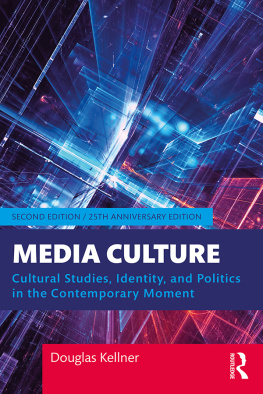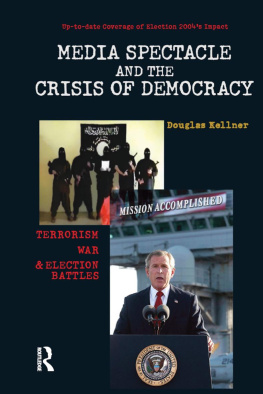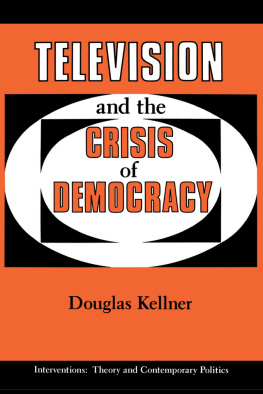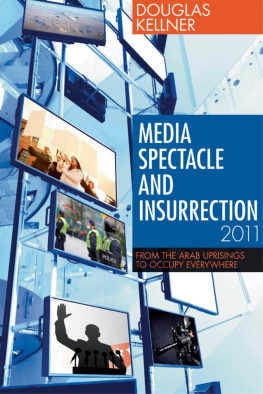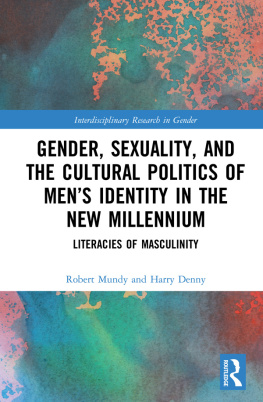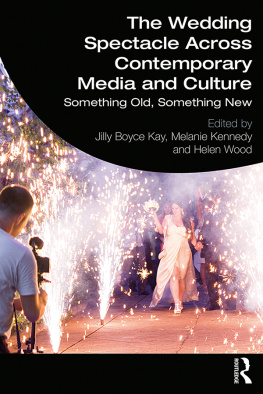Douglas Kellner - Media culture : cultural studies, identity, and politics in the contemporary moment
Here you can read online Douglas Kellner - Media culture : cultural studies, identity, and politics in the contemporary moment full text of the book (entire story) in english for free. Download pdf and epub, get meaning, cover and reviews about this ebook. year: 2020, publisher: Taylor & Francis Group, genre: Politics. Description of the work, (preface) as well as reviews are available. Best literature library LitArk.com created for fans of good reading and offers a wide selection of genres:
Romance novel
Science fiction
Adventure
Detective
Science
History
Home and family
Prose
Art
Politics
Computer
Non-fiction
Religion
Business
Children
Humor
Choose a favorite category and find really read worthwhile books. Enjoy immersion in the world of imagination, feel the emotions of the characters or learn something new for yourself, make an fascinating discovery.
- Book:Media culture : cultural studies, identity, and politics in the contemporary moment
- Author:
- Publisher:Taylor & Francis Group
- Genre:
- Year:2020
- Rating:4 / 5
- Favourites:Add to favourites
- Your mark:
- 80
- 1
- 2
- 3
- 4
- 5
Media culture : cultural studies, identity, and politics in the contemporary moment: summary, description and annotation
We offer to read an annotation, description, summary or preface (depends on what the author of the book "Media culture : cultural studies, identity, and politics in the contemporary moment" wrote himself). If you haven't found the necessary information about the book — write in the comments, we will try to find it.
Media culture : cultural studies, identity, and politics in the contemporary moment — read online for free the complete book (whole text) full work
Below is the text of the book, divided by pages. System saving the place of the last page read, allows you to conveniently read the book "Media culture : cultural studies, identity, and politics in the contemporary moment" online for free, without having to search again every time where you left off. Put a bookmark, and you can go to the page where you finished reading at any time.
Font size:
Interval:
Bookmark:

In this thorough update of one of the classic texts of media and cultural studies, Douglas Kellner argues that media culture is now the dominant form of culture that socializes us and provides and plays major roles in the economy, polity, and social and cultural life.
The book includes a series of lively studies that both illuminate contemporary culture and society, while providing methods of analysis, interpretation, and critique to engage contemporary U.S. culture. Many people today talk about cultural studies, but Kellner actually does it, carrying through a unique mixture of theoretical analysis and concrete discussions of some of the most popular and influential forms of contemporary media culture. Studies cover a wide range of topics including: Reagan and Rambo; horror and youth films; womens films, the TV series Orange Is the New Black and Hulus TV series based on Margaret Atwoods The Handmaids Tale; the films of Spike Lee and African American culture; Latino films and cinematic narratives on migration; female pop icons Madonna, Beyonc, and Lady Gaga; fashion and celebrity; television news, documentary films, and the recent work of Michael Moore; fantasy and science fiction, with focus on the cinematic version of Lord of the Rings, Philip K. Dick and the Blade Runner films, and the work of David Cronenberg.
Situating the works of media culture in their social context, within political struggles, and the system of cultural production and reception, Kellner develops a multidimensional approach to cultural studies that broadens the field and opens it to a variety of disciplines. He also provides new approaches to the vexed question of the effects of culture and offers new perspectives for cultural studies. Anyone interested in the nature and effects of contemporary society and culture should read this book.
Douglas Kellner is George Kneller Chair in the Philosophy of Education at UCLA, U.S.A., and is author of many books on social theory, politics, history, and culture, including American Nightmare: Donald Trump, Media Spectacle, and Authoritarian Populism (2016) and American Horror Show: Election 2016 and the Ascent of Donald J. Trump (2017).
Second edition published 2020
by Routledge
2 Park Square, Milton Park, Abingdon, Oxon OX14 4RN
and by Routledge
52 Vanderbilt Avenue, New York, NY 10017
Routledge is an imprint of the Taylor & Francis Group, an informa business
2020 Douglas Kellner
The right of Douglas Kellner to be identified as author of this work has been asserted by them in accordance with sections 77 and 78 of the Copyright, Designs and Patents Act 1988.
All rights reserved. No part of this book may be reprinted or reproduced or utilized in any form or by any electronic, mechanical, or other means, now known or hereafter invented, including photocopying and recording, or in any information storage or retrieval system, without permission in writing from the publishers.
Trademark notice: Product or corporate names may be trademarks or registered trademarks, and are used only for identification and explanation without intent to infringe.
First edition published by Routledge 1995
British Library Cataloguing-in-Publication Data
A catalogue record for this book is available from the British Library
Library of Congress Cataloging-in-Publication Data
Names: Kellner, Douglas, 1943- author.
Title: Media culture : cultural studies, identity, and politics in the contemporary moment / Douglas Kellner.
Description: Second edition. | London ; New York : Routledge, 2020. | Includes bibliographical references and index.
Identifiers: LCCN 2019057990 (print) | LCCN 2019057991 (ebook) | ISBN 9780367199333 (hardback) | ISBN 9780367199340 (paperback) | ISBN 9780429244230 (ebook)
Subjects: LCSH: Mass mediaUnited States. | Popular cultureUnited States.
Classification: LCC P92.U5 K38 2020 (print) | LCC P92.U5 (ebook) | DDC 302.230973dc23
LC record available at https://lccn.loc.gov/2019057990
LC ebook record available at https://lccn.loc.gov/2019057991
ISBN: 978-0-367-19933-3 (hbk)
ISBN: 978-0-367-19934-0 (pbk)
ISBN: 978-0-429-24423-0 (ebk)
A media culture emerged in the twentieth century in which images, sounds, stories, and spectacles helped produce the fabric of everyday life, dominating leisure time, shaping political views and social behavior, and providing the materials out of which people forge their very identities. Radio, television, film, popular music, newspapers and magazines, the Internet and social networking, accompanied by the rise and dissemination of new media platforms like Facebook, YouTube, and Google, help construct our notion of what it means to be male or female, and our conception of class, of ethnicity and race, of nationality, of sexuality. Media culture divides the world into categories of us and them and tell us who are our friends and enemies, who we should love and hate, and who we are and should be.
Media images, narratives and spectacles thus help shape our view of the world and our deepest values: what we consider good or bad, positive or negative, moral or evil. Media stories provide the symbols, myths, and resources through which we constitute a common culture and through the appropriation of which we insert ourselves into this culture. Media spectacles demonstrate who has power and who is powerless, who is allowed to exercise force and violence, and who is not. They dramatize and legitimate the power of the powers that be and show the powerless that they must stay in their places.
Media culture encompasses radio and the commercial reproduction of sound disseminated by the music industry in ever-changing formats from albums to CDs to digital devices. It consists of the mutating film, television, and video industries with their theatrical spectacles and cable channels that show everything from movies to TV news and entertainment to sports to pornography. Significantly, media culture has been absorbed into the Internet and social networking that transforms the products of media culture into digital artifacts and pleasures.
Media culture was initially industrial culture, organized on the model of mass production and consumption, and for decades was produced largely for mass audiences according to genre and formula, producing products that would attract consumers, fans, and dollars. It has been a form of commercial culture and its products are commodities that attempt to attract private profit produced by giant corporations interested in the accumulation of capital. Since media culture in the United States and other countries that privilege media corporations over state media must attract large audiences, it must resonate with current themes and concerns, popular tastes and pleasures, and thus is highly topical, providing hieroglyphics of contemporary social life. Yet media culture is increasingly a high-tech culture, deploying the most advanced technologies and new forms of media. It is a vibrant sector of the economy, one of the most profitable sectors and one that is attaining global prominence. Media culture is thus a form of technoculture that merges culture and technology in new forms and configurations, producing novel types of societies in which media and technology become organizing principles.
Since, we are immersed from cradle to grave in a media culture and society, it is important to learn how to understand, interpret, and criticize its meanings and messages. The media are a profound and often misperceived source of cultural pedagogy: They contribute to educating us how to behave and what to think, feel, believe, fear, and desire and what not to. The media are forms of pedagogy that teach us how to be men and women. They show us how to dress, look, and consume; how to react to members of different social groups; how to be popular and successful and how to avoid failure; and how to conform to the dominant system of norms, values, practices, and institutions. Consequently, learning how to read, criticize, and resist sociocultural manipulation can help empower oneself in relation to dominant forms of media and culture. It can enhance individual sovereignty vis--vis media culture and give people more power over their cultural environment and the necessary forms of literacy necessary to empower us in our contemporary media environment and to participate in a society that increasingly demands new forms of literacy.
Font size:
Interval:
Bookmark:
Similar books «Media culture : cultural studies, identity, and politics in the contemporary moment»
Look at similar books to Media culture : cultural studies, identity, and politics in the contemporary moment. We have selected literature similar in name and meaning in the hope of providing readers with more options to find new, interesting, not yet read works.
Discussion, reviews of the book Media culture : cultural studies, identity, and politics in the contemporary moment and just readers' own opinions. Leave your comments, write what you think about the work, its meaning or the main characters. Specify what exactly you liked and what you didn't like, and why you think so.

